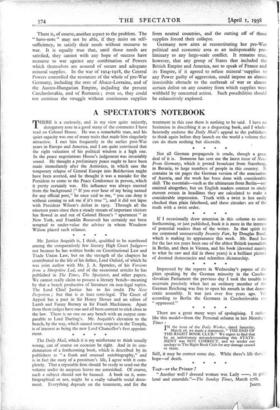Mr. Justice Asquith is, I think, qualified to be numbered
among the comparatively few literary High Court Judges— not because he has written books on Constitutional Law and Trade Union Law, but on the strength of the chapters he contributed to the life of his father, Lord Oxford, of which he was joint author with Mr. J. A. Spender, of his Versions from a Shropshire Lad, and of the occasional articles he has published in The Times, The Spectator, and other papers. We cannot really claim to possess a literary bench—meaning by that a bench productive of literature on non-legal topics. The Lord Chief Justice has to his credit The New Despotism ; but that is at least semi-legal. The Court of Appeal has a poet in Sir Henry Slesser and an editor of Lamb and Fanny Burney in Sir Frank Mackinnon. Apart from them judges have one and all been content to stick close to the law. There is no one on any bench with an output com- parable to Lord Darling's. Mr. Asquith's elevation to the bench, by the way, which caused some surprise in the Temple, is of interest as being the new Lord Chancellor's first appoint- ment. * * *














































 Previous page
Previous page